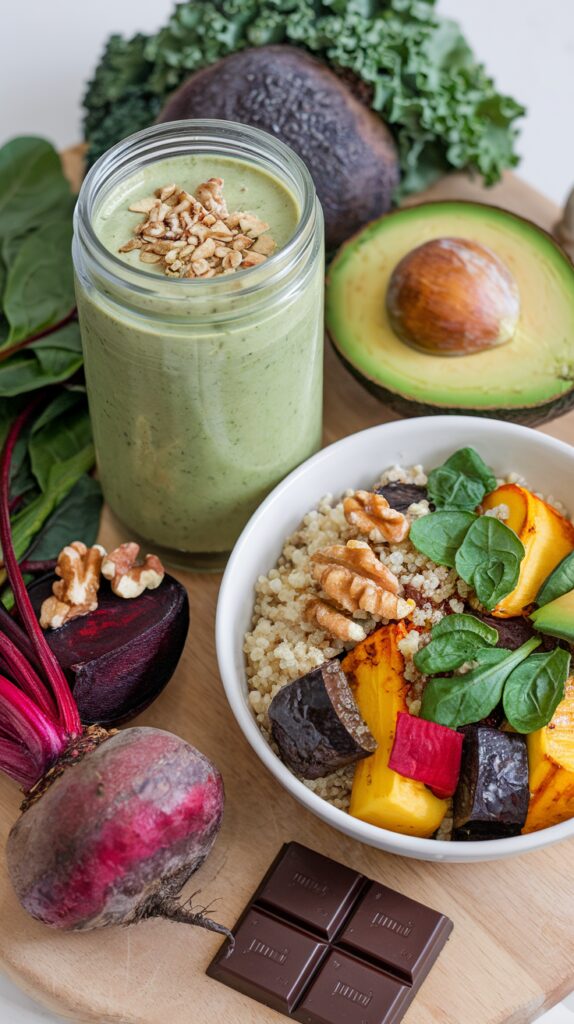
Maintaining balanced hormones is essential for overall health, yet hormonal imbalances are surprisingly common. A hormone balancing diet plays a significant role in regulating hormones and supporting your body’s natural processes.
This list explores 21 incredible foods that help balance hormones and improve your well-being!
Understanding Hormones
What Are Hormones and Why Do They Matter?
Hormones are chemical messengers produced by glands in your body. They control various functions like metabolism, mood, reproductive health, and growth. When hormone levels are out of sync, it can lead to mood swings, weight gain, fatigue, or more severe health issues.
Common Hormonal Imbalances
Hormonal imbalances include conditions like estrogen dominance, low testosterone, thyroid dysfunction, or PCOS (Polycystic Ovary Syndrome). These imbalances interfere with your body’s natural rhythm and require attention for long-term health.
How Foods Affect Hormones
Nutritional Impact
What you eat matters. Nutrient-rich, whole foods give your body the building blocks to produce and regulate hormones naturally. On the flip side, processed foods high in sugar and trans fats can disrupt this process.
Macronutrients Role
Proteins, healthy fats, and complex carbohydrates directly influence hormone production. A balanced intake ensures stable insulin levels, healthy thyroid function, and proper estrogen metabolism.
21 Foods That Balance Hormones
1. Avocado
Avocados are rich in healthy monounsaturated fats, which your body needs for hormone production. They also contain plant sterols that may naturally improve estrogen and progesterone levels.
2. Leafy Greens
Magnesium-rich greens like spinach, kale, and Swiss chard support adrenal health and reduce stress-related cortisol levels. They’re an excellent source of antioxidants for hormonal stability.
3. Fatty Fish
Salmon, mackerel, and sardines are loaded with omega-3 fatty acids. These healthy fats promote hormone balance by enhancing cell communication and reducing inflammation.

Photo by Darina Belonogova
4. Nuts and Seeds
Flaxseeds, walnuts, and pumpkin seeds are packed with lignans and omega-3s. These compounds support estrogen metabolism and promote hormonal balance.
5. Fermented Foods
Probiotics found in yogurt, kimchi, and sauerkraut maintain gut health, which is tightly linked to hormone production and regulation.
6. Cruciferous Vegetables
Broccoli, cauliflower, and Brussels sprouts contain indole-3-carbinol, a compound that helps your body metabolize excess estrogen. This reduces the risk of estrogen dominance.
7. Berries
Blueberries, strawberries, and raspberries are rich in antioxidants, which protect your cells from oxidative stress and maintain hormonal health.
8. Coconut Oil
This versatile oil contains medium-chain triglycerides (MCTs), which support hormonal function and provide quick energy without spiking blood sugar.
9. Dark Chocolate
High-quality dark chocolate (70% cacao or more) contains antioxidants and magnesium, both of which support stress hormones like cortisol.
10. Olive Oil
Extra virgin olive oil is a powerhouse of healthy fats and anti-inflammatory compounds, essential for optimal hormone regulation.
11. Eggs
Eggs are nutrient-dense and provide cholesterol, which is essential for synthesizing hormones like testosterone and estrogen.
12. Yogurt
Full-fat, natural yogurt is rich in probiotics, which promote gut health and aid in the stabilization of hormone levels.
13. Sweet Potatoes
As a source of complex carbohydrates, sweet potatoes help stabilize blood sugar and insulin levels, preventing hormonal imbalances.
14. Beans and Legumes
High in fiber and protein, beans and legumes (like lentils and chickpeas) help regulate blood sugar and improve digestive processes that affect hormones.
15. Quinoa
A complete protein and gluten-free grain, quinoa provides amino acids and complex carbs that contribute to balanced cortisol and insulin levels.
16. Garlic
Garlic contains allicin, which reduces inflammation and helps regulate the stress hormone cortisol.
17. Turmeric
This golden spice contains curcumin, a powerful anti-inflammatory compound that supports your body’s ability to metabolize hormones.
18. Green Tea
Green tea is rich in catechins, which improve insulin sensitivity and reduce cortisol levels, providing a boost to hormone balance.
19. Ginger
Well-known for its anti-inflammatory properties, ginger also supports digestion and hormonal harmony in the body.
20. Cinnamon
Cinnamon helps regulate blood sugar and insulin, key players in maintaining hormonal health.
21. Pomegranates
This antioxidant-rich fruit may help block excess estrogen while reducing inflammation in the body.
Incorporating Hormone-Balancing Foods Into Your Diet
Start by swapping out processed snacks for nutrient-dense options like fruits, seeds, and nuts. Include leafy greens and healthy fats in meals, and lean towards complex carbs like quinoa and sweet potatoes over refined grains. Adding fermented foods, spices like turmeric, and green tea to your diet is another easy way to keep hormones stable.
Conclusion
The foods you eat directly affect your hormones. Incorporating these 21 hormone-balancing foods into your routine supports your body’s natural processes and improves overall wellness. Making small changes, such as adding nuts to your breakfast or choosing salmon for dinner, can significantly impact your life. Start today by prioritizing whole, nutrient-rich options to feel your best!
